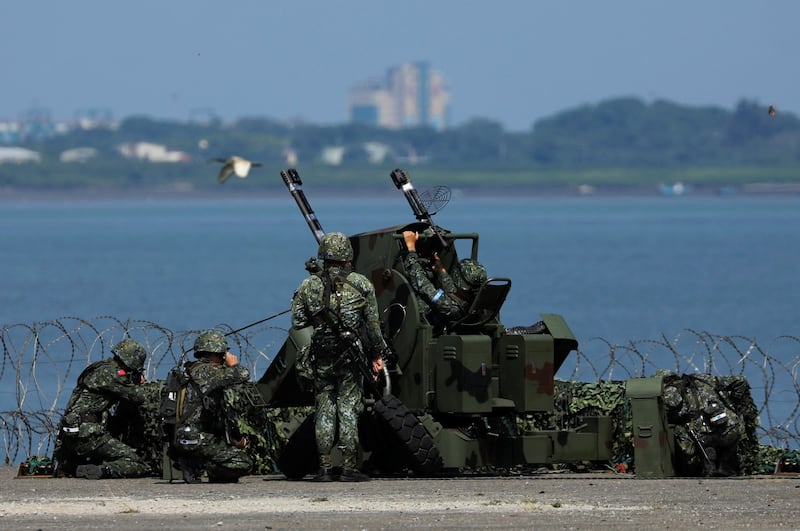In its daily briefing on Chinese military activities around Taiwan on Monday, Taipei's Ministry of National Defense said that just two People's Liberation Army aircraft were in the air.
Just over a week ago, on the other hand, China sent a total of 32 military aircraft and nine naval vessels into Taiwan’s air defense identification zone and waters around the island over a 24-hour period.
An expert described it at the time as a mock "blockade."
Speaking on the condition of anonymity due to the sensitivity of military matters in the Taiwan Strait, another military analyst told RFA that “blockade” was too strong a word.
China, he said, was mostly carrying out “practice runs” on a non-invasive scale, but that didn’t mean that China was simply “saber-rattling.”
Even as the daily tallies of air and sea vessels encircling Taiwan and pressing at the country’s air defense identification zone are so routine as to barely raise an eyebrow in downtown Taipei, the notion of the threat of war is ever present.
According to Chinese-language media reports in Taiwan, the Ministry of National Defense’s recent “2023 PLA Military Power Report,” which was submitted to Taiwan’s Legislative Yuan, suggests that an invasion of Taiwan has become more likely during Chinese President Xi Jinping’s third five-year term.
Speaking to RFA Mandarin in late July after a high-profile shakeup of China's rocket command, Yao Cheng, a former lieutenant colonel in China's Navy Command who defected to the United States in 2016, said that Xi is determined to carry out a military invasion of Taiwan.
“He definitely wants to go to war,” said Yao. “Otherwise, he can't realize [the goals of] his third term in office.”
The Chinese Communist Party (CCP) sees self-ruled Taiwan, or the Republic of China, as a province of China, even though the island has never been ruled by the CCP.
At the last meeting of the National People’s Congress Xi spoke of an “unwavering push for the reunification process of the motherland”, and Wu Qian, a spokesperson for China's Ministry of Defense recently said that Taiwan's future lies in national unification.,
Xi has ordered the PLA to "prepare for war" in his roles as General Secretary of the CCP and head of the Central Military Commission – the overall high command of the PLA – while U.S. President Joe Biden said at a Democratic Party fundraiser last month that China was a "ticking time bomb."
“That’s not good because when bad folks have problems, they do bad things,” Biden added.
The U.S. president said that China was in “trouble” due to turgid growth and high unemployment.
Countdown to aggression
The Taiwan Ministry of Defense “2023 PLA Military Power Report” speculates that the likelihood of China attacking Taiwan and the risk of military conflict has increased.
Some experts, talking to RFA Mandarin, agree.
Yu Jie, a writer based in the U.S. and author of a recent Chinese-language book on how China might invade Taiwan, told RFA's “Asia Wants to Talk” program that the CCP is currently moving in the direction of becoming a “global empire,” describing Taiwan as the final puzzle piece.
“The crisis is gradually approaching,” said Yu.
The author speculates that Xi’s timeline for invasion is likely to be five to 10 years – before his possible retirement.
“Xi hasn’t cultivated a truly legitimate successor, so when factions vie for power, one of the contenders might wage an external war to boost their prestige,” he said.

Last year, the New York times reported that an attack on Taiwan could occur as soon as 2025, when presidential elections will take place in both Taiwan and the U.S., a scenario that few military strategists regard as likely – but not outside the realms of plausibility.
Huang Pengxiao, a retired Taiwanese colonel and current affairs commentator, pointed out in RFA Mandarin’s “Asia Wants to Talk” last week that logically, China would eventually attack Taiwan.
But he added, “Unless U.S. hegemony declines, meaning the rise of the East and the decline of the West, the chances … of an attack isn’t imminent – there's still a wait.”
Author Yu Jie said that the U.S. expectation that increased trade with China would lead to a more relatable, friendly China hadn’t happened, but the U.S. is appropriately changing the terms of engagement.
“Decoupling might take a decade or even longer, so I agree with the approach [the U.S. is taking] of talking on one hand and sanctioning on the other.”
A PLA analyst who asked to remain anonymous said that China’s current daily aerial and naval harassment of Taiwan could not transition into war overnight.
“We’d expect a whole lot more activity in the Taiwan Strait if they were transitioning to war,” he said.
As John Culver recently wrote in the Carnegie Endowment for International Peace, "China would have already started surging production of ballistic and cruise missiles; anti-air, air-to-air, and large rockets for long-range beach bombardment; and numerous other items, at least a year before D-Day."
Edited by Mike Firn and Elaine Chan.

